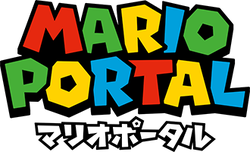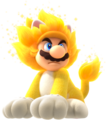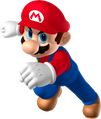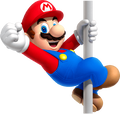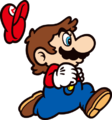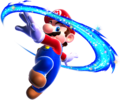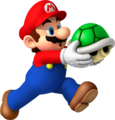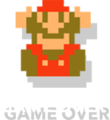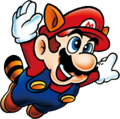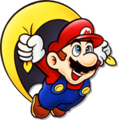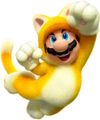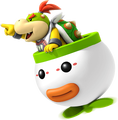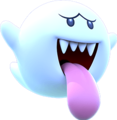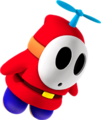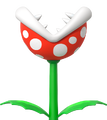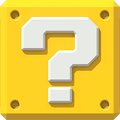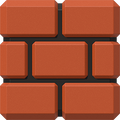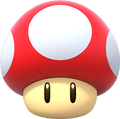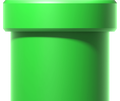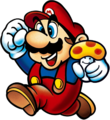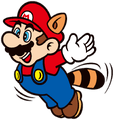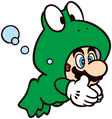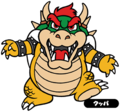User:DryBonesBandit/Mario Portal: Difference between revisions
Nintendo101 (talk | contribs) |
(→Errors, oversights, and "odd choices": thought i'd list this here to not forget) |
||
| Line 75: | Line 75: | ||
*NSMBUD: the blue Dragoneel is considered the same entity as the red Dragoneel. | *NSMBUD: the blue Dragoneel is considered the same entity as the red Dragoneel. | ||
*NSMBUD: despite technically being part of the release, none of the enemies unique to New Super Luigi U are listed on this page. | *NSMBUD: despite technically being part of the release, none of the enemies unique to New Super Luigi U are listed on this page. | ||
*SM3DW+BF: the section for ''Bowser's Fury'' is incorrectly called ''Fury World''. | |||
*SM3DW+BF: the correct enemy is labeled the [[Small Rammerhead]] on this page. | *SM3DW+BF: the correct enemy is labeled the [[Small Rammerhead]] on this page. | ||
*SM3DW+BF: the pink Hisstocrat is absent. | *SM3DW+BF: the pink Hisstocrat is absent. | ||
Revision as of 19:05, February 13, 2025
- “It's-a me, MARIO! HERE WE GO!”
- —Scrolling text, Mario Portal
The Mario Portal is a website created by Nintendo for Super Mario news and information.
The website is available in Japanese and English, and defaults to Japanese.
Sections
The website is divided into five sections; the main page, history, characters, games, and goods. Additionally listed are "Movie" and "Theme Park"; however, when clicked, they lead to the official Nintendo website.
Main page
The main page of the website begins with multiple scrolling images at the top, links to the official Nintendo website, buttons that lead to other sections, and a biography for Mario. Under the biography, it includes a few screenshots of games such as Super Mario Bros. and Super Mario Odyssey, as well as artwork of Mario. Past that, there's two images changing between multiple different forms and screenshots of them in action, specifically, Tanooki Mario, Cape Mario, Wing Cap Mario, Bee Mario, and Cat Mario. Underneath the changing images is a scrolling section titled "MARIO PLAYS..." featuring panels showcasing "Kart", "Golf", "Tennis", and "Base-ball" alongside artwork relating to the activities. Following this are more buttons leading to other sections. At the bottom of the page is a ? Block that leads back to the top of the page when clicked; however, if hovered over, it will play a coin-collecting animation and turn into an Empty Block until it is no longer hovered over.
History
The history section serves as a list of most[1] titles sold in Japan, ranging from 1985 with the release of Super Mario Bros. to 2024, currently showing Paper Mario: The Thousand Year Door for the Nintendo Switch as the latest title. It also features five filters; showing all titles (the default); titles by series, which includes the Super Mario, Mario Kart, Mario Party, Mario Tennis, Paper Mario, Mario & Luigi, Mario Golf, Mario Strikers, Super Mario RPG, and Mario vs. Donkey Kong series; titles by decade, which includes the 1980s, 1990s, 2000s, 2010s, and 2020s; titles by console, which includes the Family Computer and Super Family Computer, Game Boy Advance, Wii and Wii U, Family Computer Disk System, Nintendo 64, Nintendo GameCube, Nintendo DSiWare, Smartphone apps, Game Boy and Game Boy Color, Nintendo DS and Nintendo 3DS, and Nintendo Switch; and titles by genre, which includes action, sports, tactics, race, RPGs, puzzle, party, and adventure games. Additionally, a bar which scrolls by year is always present on screen, and the ? Block from the main page returns at the bottom, this time featuring Luigi climbing up a vine if hovered over.
The history section is represented by a Flagpole icon.
Errors, oversights, and "odd choices"
(This is just an offhand list that you can revise and format however you like)
- General: The names for colored enemy variants were largely updated from "Name (Color)" to "Color Name" in January 2025, but they did not do this for Bowser (in TLL), Birdo, or Hisstocrat (in SM3DW).
- General: The Big Fire Piranha Plant's name is missing the "t" on nearly every page. The only exception is New Super Mario Bros. 2.
- General: The "top" in Spike Top's name is lowercased.
- TLL: Bowser's Brother is referred to as "Fake Bowser (Blue)" in English. A direct translation from the Japanese name for this boss on the page would be "Bowser (Blue)."
- SMB3: Despite being the only Big Koopa Paratroopa in the game, the page clarifies this the one in the game is the "Green Mega Koopa Paratroopa," (originally called the "Mega Koopa Paratroopa (Green)").
- SMB3: The "Big Bertha" type of Mega Cheep Cheep is not displayed.
- SMB3: The red and green types of Piranha Plants and Fire Piranha Plants are considered alternate forms of the same enemy, not as different colored variants.
- SMB3: Despite its parent being called "Mini Goomba" on the page, the block-inhabiting variant is called a "Pile-driver Micro-Goomba."
- SML: No artwork is displayed for any of the power-up forms, despite ones existing.
- SML: With the exception of the Piranha Plants, all enemies have their names from the English instruction booklet for the original Game Boy release, not the more recent names from the 3DS Virtual Console release. This is also true of the power-ups.
- SML: Bunbun's name is translated as "Boom Boom."
- SMW: Despite existing on the SMB and TLL pages, artwork for Fire Mario is absent.
- SMW: The Amazing Flyin' Hammer Brother's name is displayed as "A. F. H. Bro," its name from Super Princess Peach.
- SMW: Li'l Sparky's name is displayed without the apostrophe. This is not the case on other pages.
- SMW: Colored variants of Unshelled Koopa Troopas are not displayed despite exhibiting different behaviors like the shelled Koopas.
- SMW: Spinners are absent despite being considered proper enemies in the original Shogakukan guidebook for SMW. Matches a reclassification from the encyclopedia.
- SML2: The Bopping Toady's name is displayed as "Bopping Frog." This is one of the few enemies that is present in the original instruction booklet, so it was one of the few that had a conventionally localized name.
- SML2: The names for most of the enemies here match the research done by the Super Mario Wiki userbase through its policies, which prioritize English sources like Nintendo Power, which appears to have lead to to some oddities one would not expect from a professional localization (e.g. a boss called "Rick" in Japanese is referred to as "sewer rat" on the page, despite not being encountered in a sewer). Other informal, nondescript names on the page include "ant," "bird," "collector," "shark," and "octopus." Other enemies have Romanizations of their Japanese names, such as Unibo, Kiddokatto, Kurokyura, and Goronto.
- The exceptions here are enemies that appear in prior and future games, the ones named in the original instruction booklet (Skeleton Bee, Spikey, Grubby, Noko Bombette, Battle Beetle, and Wario), and the few that seemed to have wholly new, conventionally localized names (Aqua Goomba, Ghost Goomba, Masked Ghoul, Birdfish, Fireball Boy, Bucho, Bupon, Buro, and Moofish).
- SML2: there are three colored varieties of Bomubomu, but only one is shown on the page.
- SM64: the Small Fire Piranha Plant's name is missing the "t."
- SM64: Snufit's name is translated as "Snifit."
- SM64: Ukiki is considered an enemy.
- SMS: despite existing, there is no artwork for the Rocket Nozzle or Turbo Nozzle on the page.
- SMS: the Wind Spirit is named "Cyclo," a name that has never been published prior.
- SMS: the red and blue types of Wire Traps are considered alternate forms of the same enemy, not as different colored variants, despite exhibiting different behaviors.
- SMS: the Sleepy Boo's name is translated as "Big Boo."
- SMS: the colored variants of Proto Piranha are all considered iterations on the same boss, not as different colored variants. (Do they actually have legitimate differences between them, or is it an misperception on our parts?)
- SMS: the Winged Strollin' Stu's name is translated as "Blue Swipin' Stu," and while this parallels how it is a colored variant of the green Swipin' Stu, the blue ones do not steal Mario's hat.
- SMS: only one of the colored Cheep Cheeps is displayed, with the other one completely absent despite both exhibiting different behaviors.
- SMS: the Phantamanta's name is translated as "Manta."
- SMS: Mecha-Bowser's name is translated as "Mechakoopa."
- NSMB: despite existing, no artwork for Small Mario Mega Mario is displayed. This is also true of Mini Mario, whose artwork from this game is used on the page for New Super Mario Bros. Wii.
- NSMB: the type of Skeeter in this game is referred to as "Skeeter" in English. A direct translation from the Japanese name for this enemy page would be "Bomb Skeeter."
- SMG: like Super Mario Land 2, some of the names seem to match those from Super Mario Wiki research, specifically ice bat and bat (whose names derive from the Prima guidebooks), Mandibug Stack (a conjectural name), and Ball Beamer (most related enemies are simply called "Beam," in their names. The use of "Beamer" comes directly from the in-game file designations.)
- SMG: the mole enemy is called "Rocky Wrench" despite being a different enemy. In the Prima guidebook, it is called "Monty," which is also incorrect.
- SMG: the screenshots for the Ruby Rock and Big Ruby Rock are swapped.
- SMG: the type of Bone Twister with spiked rocks is absent.
- NSMBW: despite existing, no artwork for Small Mario is displayed.
- NSMBW: despite being the only Climbing Koopa in the game, the one here is specified as the "Green Climbing Koopa."
- NSMBW: Big Deep Cheep is absent. This matches its omission in the encyclopedia.
- SMG2: the name of the Space Mine is displayed as "Mikey Mine," the naval variant that does also appear in Super Mario Galaxy 2, but is unlisted here.
- SMG2: the little Whomp enemy is named "Whimp." This first appeared as a conjectural moniker on Super Mario Wiki.
- SM3DL: the artwork for Fire Mario is the same one from New Super Mario Bros. U Deluxe. In the original release, the art used was the same one from New Super Mario Bros., which sees use on Mario Portal for other games.
- NSMB2: Small Mario is absent.
- NSMB2: Gold Mini Goomba, Climbing Koopa, Gold Big Piranha Plant, and Big Chain Chomp are absent.
- NSMBU: the blue Dragoneel and Big Cheep Cheep are absent. The blue Dragoneel notably is not acknowledged in the encyclopedia as well despite being physically and behaviorally different.
- SM3DW: the wrong enemy is shown for the Small Rammerhead.
- SM3DW: Hisstocrat (pink) is the only colored variant of a boss to be listed separately.
- SMO: Invincible Mario is absent despite being available.
- SMO: Burrbo (Crumbleden) is absent.
- SMO: Goombette, Glydon, Lakitu, and Moe-Eye are listed as enemies, which is not done in any other source for Super Mario Odyssey.
- SMO: the pixel versions of enemies are considered the same entities as their 3D counterparts. This is not done in at least one Japanese guidebook for Super Mario Odyssey, which considers them distinct variants.
- SMO: the Snow Cheep Cheep is considered the same entity as the normal Cheep Cheep.
- NSMBUD: they use the original artwork of Bowser from New Super Mario Bros. U, rather than the new render made for New Super Mario Bros. U Deluxe
- NSMBUD: the blue Dragoneel is considered the same entity as the red Dragoneel.
- NSMBUD: despite technically being part of the release, none of the enemies unique to New Super Luigi U are listed on this page.
- SM3DW+BF: the section for Bowser's Fury is incorrectly called Fury World.
- SM3DW+BF: the correct enemy is labeled the Small Rammerhead on this page.
- SM3DW+BF: the pink Hisstocrat is absent.
- SM3DW+BF: the Potted Piranha Plant and Potted Cat Piranha Plant are listed as enemies.
- SM3DW+BF: the Blue Lava Bubble is listed as a seperate enemy from the normal one despite having no mechanical differences in this game.
- BF: the Cat Goomba Tower, Innertube Cat Goomba, Skating Cat Goomba, Cat Big Piranha Plant, and Cat Bullet Bill are absent.
- SMBW: Racing Wiggler is listed as an enemy.
- SMBW: King Boo, Kamek, Big Fire Piranha Plant, Cloud Piranha, Wonder Packun, Note Piranha Plant, and Big Note Piranha Plant are absent.
- SMBW: the light-blue and colorless Bloomps that appear during a Wonder Effect are absent, just like the Japanese guidebooks.
Characters
The characters subpage contains 14 characters and enemies from the franchise alongside descriptions. The characters section is represented by a Goomba, despite not listing the enemy. Additionally, the ? Block makes another appearance, again using the coin animation.
| Image | Name | Website description |
|---|---|---|
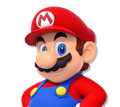
|
Mario | The main hero of the Mushroom Kingdom. Mario is always bright and cheerful and instantly recognizable with his blue overalls, red cap, and trademark moustache. He's a trusted friend of Princess Peach, and he and his brother Luigi are known across the land for their acts of bravery. Mario excels at sports including tennis, golf, baseball, soccer, and even kart racing. He's good at all of them! He's a plumber by profession but is really a jack of all trades. He uses his masterful jumping ability and a variety of power-ups to take on his archrival, Bowser. |
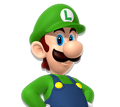
|
Luigi | Mario's brother and fellow hero of the Mushroom Kingdom. Luigi is instantly recognizable in his trademark green hat and green shirt. Luigi is kind but can be a bit nervous, especially around ghosts However, his abilities are on par with Mario's, so when these brothers team up, there's nothing they can't achieve. Luigi is taller and can jump higher than Mario. If you look closely, you may also notice that the shape of his moustache is a bit different as well. |
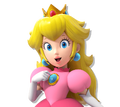
|
Peach | The beloved princess of the Mushroom Kingdom. She's extremely kind and is always working to create a world where everyone can live together happily. Her signature pink dress is quite lovely. Princess Peach is always game for a variety of sports, and also enjoys baking and cooking. Princess Peach and Mario are good friends and help each other out whenever they can. |
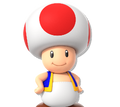
|
Toad | A resident of the Mushroom Kingdom who works in service of Princess Peach. Toad has red spots on his head, though others of his kind come in a variety of colors. Toad is very cheerful and loyal. He does his best to help Mario and Luigi in their efforts to protect the Mushroom Kingdom from Bowser, even if he ends endangering himself in the process. |

|
Bowser | The King of the Koopas. Bowser is Mario's archrival and is always causing trouble in the Mushroom Kingdom. Bowser commands many underlings, including Koopas, Goombas, Bullet Bills, and Shy Guys. Whenever he sets his sights on the Mushroom Kingdom, his plans are often foiled by Mario and friends. Bowser is a mighty foe who possesses incredible strength and can even breathe fire. |
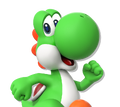
|
Yoshi | Mario's dependable companion who hails from Yoshi's Island. He is green, but others of his kind may be other colors such as red, blue, pink, and yellow. Yoshi is kind and carefree. He uses his long tongue to gobble up fruit and enemies, which he can turn into eggs for throwing. |
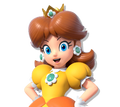
|
Daisy | The princess of Sarasaland. Her trademark style includes her yellow dress and flowery accessories. Daisy is cheerful, energetic, and enjoys playing a variety of sports with Mario and friends. |

|
Wario | The self-professed archrival of Mario. Wario wears purple overalls, a yellow hat, and has an instantly recognizable zigzag moustache.
Wario and Mario have known each other since they were babies. He's got a boisterous personality and doesn't sweat the small things. He loves garlic and making money. |
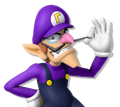
|
Waluigi | Wario's pal and accomplice. Waluigi is the self-proclaimed rival of Luigi. Waluigi is willing to put in a lot of effort to best Mario and Luigi, if only to annoy them. His long arms and long legs help keep him competitive at sports. |
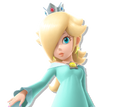
|
Rosalina | A mysterious lady who travels the galaxy accompanied by her family of star-like creatures called Lumas. Rosalina may seem a bit distant, but she is actually quite kind-hearted. She is the adoptive mother of the Lumas. Though her home is among the stars, she'll sometimes joins Mario and friends on their adventures. |
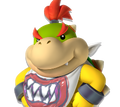
|
Bowser Jr. | The son of Bowser, the King of the Koopas. He's often seen wearing a mask with an intimidating mouth drawn on it. Bowser Jr. is small but has inherited great strength from his father. He may throw a tantrum if things don't go his way. He's know[sic] to cause plenty of trouble and can be a bit selfish. |
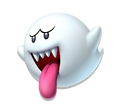
|
Boo | Mischievous ghosts who often appear in dark, abandoned places. They may be spooky ghosts, but they're also incredibly shy. They will freeze in place and cover their eyes if someone looks right at them. |

|
Donkey Kong | The king of the jungle whose trademark is his red necktie, which bears his initials. Donkey Kong can hurl giant barrels with the greatest of ease, and is so powerful the ground shakes when he pounds on the ground. He loves bananas and always keeps a large stash of them in his treehouse. |

|
Diddy Kong | Donkey Kong's trusted friend and partner. His trademarks are his red shirt with yellow stars and red cap. Though not as strong as DK, Diddy Kong is agile and a great jumper. He's fast as well, and a great ally for helping DK protect his banana stash. |
Games
The games section is a section dedicated to showcasing Super Mario games on the Nintendo Switch and on smartphones. It consists of three large banners showcasing recent Super Mario games, two pages of games for the Nintendo Switch, a link to the official Nintendo website relating to Nintendo Switch Online, and a list of smartphone games, listing only Mario Kart Tour and Super Mario Run.
The games section is represented by a Super Star icon. The ? Block returns, reusing the coin animation yet again.
Goods
The last section, the goods section, consists of a digital shop for ordering products from Nintendo's Tokyo, Osaka, and Kyoto official stores, as well as other merchandise. Currently, it lists sections based on the Super Mario series, power-ups, game history, and family and meals. Underneath, it lists new arrivals, and a link to My Nintendo store. Below, it lists amiibo and LEGO Super Mario products, with links to both of their official Nintendo website sections. Finally, at the bottom, there are two links regarding LINE stickers and iMessage stickers.
The goods section is represented by a Super Mushroom icon. Additionally, the ? Block makes a final appearance, again reusing the coin animation.
Gallery
Miscellaneous artwork
Artwork marked with an asterisk (*) is unique to the website.
Characters
Mario
Mario sliding down a Flagpole*
Mario holding a Green Shell
Mario getting a Game Over*
Other
Enemies
Boo*
Bullet Bill and Bill Blaster*
Items and Objects
History
Super Mario Bros.
Power Up
Enemies
- MPO SMB Bullet Bill.jpg
- MPO SMB Goomba.jpg
- MPO SMB Blooper.jpg
- MPO SMB Lakitu.jpg
- MPO SMB Spiny.jpg
- MPO SMB Koopa Red.jpg
Koopa Troopa (Red)
- MPO SMB Koopa Green.jpg
Koopa Troopa (Green)
- MPO SMB Spiny Egg.jpg
- MPO SMB Paratroopa Red.jpg
Koopa Paratroopa (Red)
- MPO SMB Paratroopa Green.jpg
Koopa Paratroopa (Green)
- MPO SMB Piranha Plant.jpg
- MPO SMB Lava Bubble.jpg
- MPO SMB Hammer Bro.jpg
- MPO SMB Cheep Cheep Red.jpg
Cheep Cheep (Red)
- MPO SMB Cheep Cheep Grey.jpg
Cheep Cheep (Grey)
- MPO SMB Buzzy Beetle.jpg
Super Mario Bros.: The Lost Levels
- MPO SMBLL Sky Blooper.jpg
- MPO SMBLL Blue Bowser.jpg
Fake Bowser (Blue)
- MPO SMBLL Fake Bowser.jpg
- MPO SMBLL Piranha Plant.jpg
Piranha Plant (Red)
Super Mario Bros. 3
Power Up
Enemies
- MPO SMB3 Iggy.jpg
- MPO SMB3 Wendy.jpg
- MPO SMB3 Hot Foot.jpg
- MPO SMB3 Spike.jpg
- MPO SMB3 Dry Bones.jpg
- MPO SMB3 Mega Goomba.jpg
- MPO SMB3 Mega Koopa Red.jpg
Mega Koopa Troopa (Red)
- MPO SMB3 Mega Koopa Green.jpg
Mega Koopa Troopa (Green)
- MPO SMB3 Mega Paratroopa.jpg
Mega Koopa Paratroopa (Green)
- MPO SMB3 Mega Piranha Red.jpg
Mega Piranha Plant (Red)
- MPO SMB3 Mega Piranha Green.jpg
Mega Piranha Plant (Green)
- MPO SMB3 Mega Cheep Cheep.jpg
- MPO SMB3 Bullet Bill.jpg
- MPO SMB3 Roto Disc.jpg
- MPO SMB3 Shoe Goomba.jpg
- MPO SMB3 Goomba.jpg
- MPO SMB3 Blooper.jpg
- MPO SMB3 Flame Chomp.jpg
- MPO SMB3 Blooper Nanny.jpg
- MPO SMB3 Spiny down.jpg
- MPO SMB3 Buzzy down.jpg
- MPO SMB3 Jelectro.jpg
- MPO SMB3 Lakitu.jpg
- MPO SMB3 Lava Lotus.jpg
- MPO SMB3 Angry Sun.jpg
- MPO SMB3 Blooper Scatter.jpg
- MPO SMB3 Boo.jpg
- MPO SMB3 Spiny.jpg
- MPO SMB3 Spiny Cheep.jpg
- MPO SMB3 Thwomp.jpg
- MPO SMB3 Stretch.jpg
- MPO SMB3 Koopa Red.jpg
Koopa Troopa (Red)
- MPO SMB3 Koopa Green.jpg
Koopa Troopa (Green)
- MPO SMB3 Spiny Egg.jpg
- MPO SMB3 Spiny Green.jpg
Spiny Egg (Green)
- MPO SMB3 Paragoomba.jpg
Paragoomba (Red)
- MPO SMB3 Paratroopa Red.jpg
Koopa Paratroopa (Red)
- MPO SMB3 Paratroopa Green.jpg
Koopa Paratroopa (Green)
- MPO SMB3 Parabeetle.jpg
- MPO SMB3 Piranha 1.jpg
Piranha Plant (1)
- MPO SMB3 Piranha 2.jpg
Piranha Plant (2)
- MPO SMB3 Lava Bubble.jpg
- MPO SMB3 Hammer Bro.jpg
- MPO SMB3 Sledge Bro.jpg
- MPO SMB3 Fire Snake.jpg
- MPO SMB3 Fire Piranha 1.jpg
- MPO SMB3 Fire Piranha 2.jpg
Fire Piranha Plant (2)
- MPO SMB3 Fire Nipper.jpg
- MPO SMB3 Fire Bro.jpg
- MPO SMB3 Rocky Wrench.jpg
- MPO SMB3 Ptooie 1.jpg
Ptooie (1)
- MPO SMB3 Ptooie 2.jpg
Ptooie (2)
- MPO SMB3 Boomerang Bro.jpg
- MPO SMB3 Cheep Cheep.jpg
- MPO SMB3 Cheep Green.jpg
Cheep Cheep (Green)
- MPO SMB3 Nipper Plant.jpg
- MPO SMB3 Muncher.jpg
- MPO SMB3 Piledriver.jpg
- MPO SMB3 Bob-omb.jpg
- MPO SMB3 Mini Goomba.jpg
- MPO SMB3 Buzzy Beetle.jpg
- MPO SMB3 Morton.jpg
- MPO SMB3 Larry.jpg
- MPO SMB3 Buster Beetle.jpg
- MPO SMB3 Ludwig.jpg
- MPO SMB3 Lemmy.jpg
- MPO SMB3 Roy.jpg
- MPO SMB3 Chain Chomp.jpg
